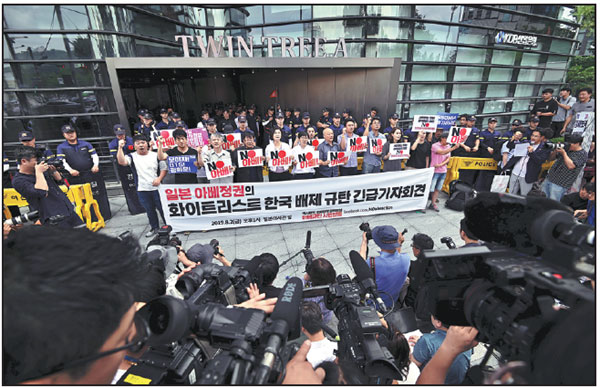Japan to remove ROK from 'white list'
Seoul says it 'won't be defeated again' as trade row with Tokyo escalates
SEOUL/TOKYO - Japan said on Friday it would remove the Republic of Korea's fast-track export status, drawing the threat of a firm response from Seoul and further straining relations already stressed by a dispute over compensation for wartime forced laborers.
The ROK will become the first country to be removed from Japan's "white list" of fast-track export destinations when the decision, approved by Japan's cabinet on Friday, will take effect on Aug 28. The list currently has 27 countries including Germany, the United Kingdom and the United States.
|
Protestors hold placards reading "No Abe!" during a rally against Japan's decision to remove the Republic of Korea from a list of favored export partners, in front of the Japanese embassy in Seoul on Friday. Jung Yeon-Je / Agence France-Presse |
The measure could require Japanese exporters to South Korea to take extra administrative procedures to obtain export permits, potentially slowing down exports of a wide range of goods that could be used to produce weapons.
Japanese Minister of Economy, Trade and Industry Hiroshige Seko told a news conference after the cabinet meeting that the decision was taken for national security reasons, and was not intended to harm bilateral relations.
But ROK officials held a different perspective, especially as Japan tightened curbs on exports to the ROK of three high-tech materials needed to make memory chips and display panels, threatening the global supply of chips.
ROK President Moon Jae-in vowed on Friday to take stern action against Japan's decision, calling it a reckless and unfair retaliatory action by Tokyo.
"We won't be defeated by Japan again," Moon told a cabinet meeting in a rare live broadcast, pointedly invoking the nation's difficult history with Japan, which colonized the Korean Peninsula before World War II. But he didn't give details of possible countermeasures.
'Selfish nuisance'
He also criticized Japan as a "selfish nuisance" for disrupting the global supply chain.
ROK Foreign Minister Kang Kyung-wha said Japan was acting in a "unilateral and arbitrary manner". Seoul has repeatedly protested Japan's actions, especially after the tightening on curbs of high-tech materials last month.
"We're gravely concerned by the decision to say the least, this coming in particular in footsteps of earlier decision that restricts some key export items to Korea," Kang said during a regional meeting in Bangkok.
While Japan has said that move was based on national security, and not political, it has also highlighted what it says is an erosion of trust after ROK court rulings ordered Japanese firms to compensate wartime forced laborers.
"We are in a situation where we cannot hold a dialogue with trust," Seko said in Tokyo.
"We want Seoul to first create an environment in which we can have dialogue with trust. It's Seoul's responsibility to do that."
Tokyo says that issue of compensation was settled by a 1965 treaty that normalized ties between the two countries.
The rift is the latest example of how a decades-old disagreement has undermined relations between the two US allies in Northeast Asia.
Seko said Japan was unwilling to hold a dialogue until Seoul corrected a statement made at a July meeting between officials from the two countries.
ROK officials, for their part, have warned they may reconsider an intelligence sharing accord with Japan if the feud worsens.
The US has urged its two key Asian allies to consider reaching a "standstill agreement" to buy more time for talks, a senior US official told reporters in Washington on Tuesday.
US Secretary of State Mike Pompeo said on Thursday that he hoped the two would find a solution by themselves.
The fresh restrictions could deal an additional blow to ROK chipmakers, which are already scrambling to secure key chipmaking materials after last month's export curbs.
Agencies - Xinhua
(China Daily 08/03/2019 page8)















